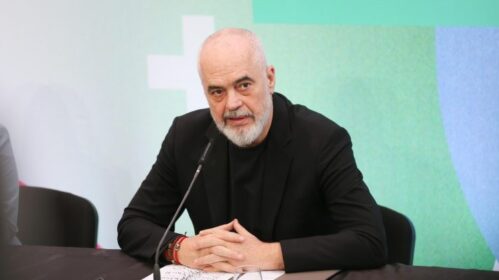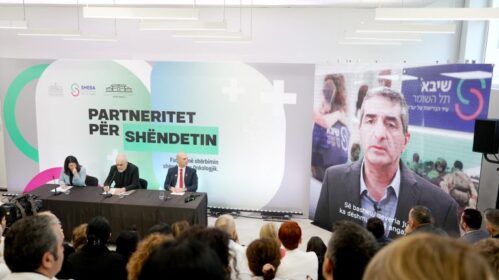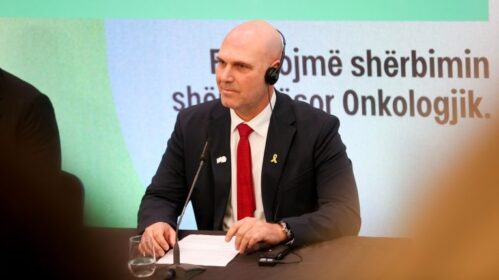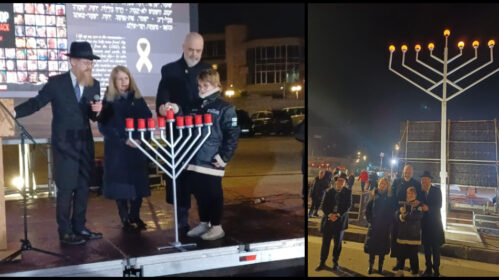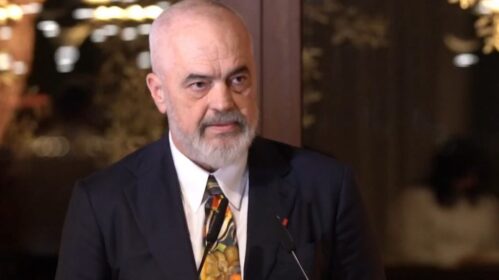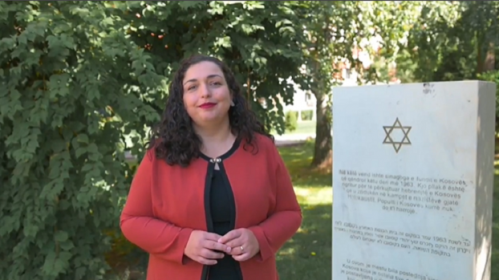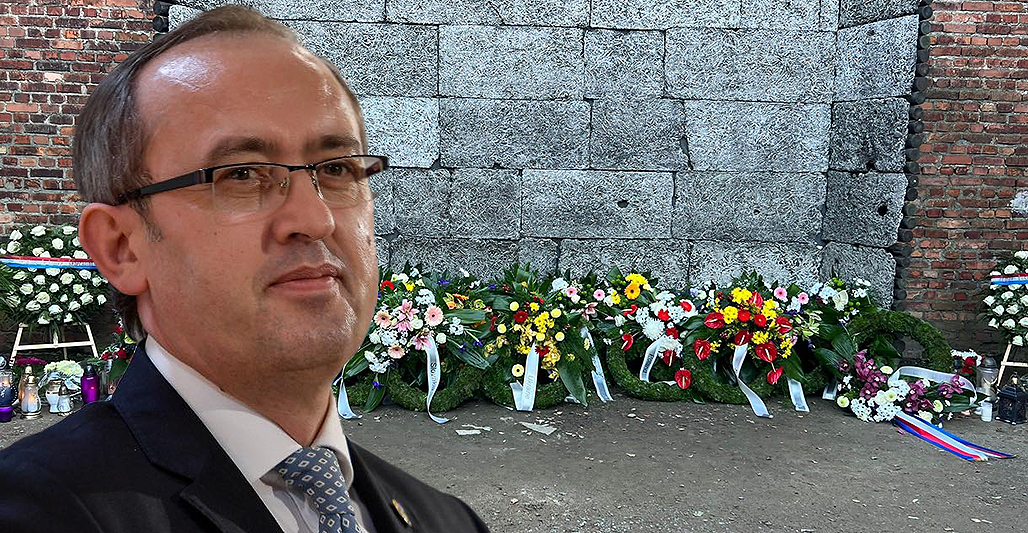[By: Ariel Scheib]
Albania, a Balkan state on the eastern border of the Adriatic Sea in southeastern Europe, has had a Jewish presence since 70 CE in the Roman period. Over the centuries, Jews settled in Albania but never established a permanent community. Today, the Jewish population of Albania is negligable.
– Early History
– World War II
– Jewish Community Today
Ndiq "Izraeli Sot" në Facebook dhe Twitter dhe Instagram dhe behu anetar i Grupit Izraeli dhe Shqiptaret
Early History
According to Albanian historian Apostol Kotani, Jews may have first arrived in Albania as early as 70 C.E. as captives on Roman ships that washed up on the country’s southern shores. Kotani believes that is was the descendants of these captives that would build the first synagogue in the southern port city of Sarande in the fifth centry.
Litte is know about the Jewish community in the area until the 15th century. From 1478 to 1913, Albania was under the rule of the Ottoman Empire and following the Spanish Inquisition of 1492, Jews from the Iberian peninsula began to settle in seaports and establish a small Jewish community in Albania.
Jews continued to settle in the country throughout the 16th century, eventually constituting nearly one-third of the total population of Vlore, that main administrative and military city in the country. Jewish communities also formed in Berat, Durazzo, Elbassan, and Valona; all areas in which large trading industries existed. Castilian, Catalonian, Sicilian, Portuguese, and Apulian synagogues were erected throughout Albania.
In 1673, after being exiled by the Turkish sultan, the false prophet Shabbetai Zevi found refuge in Albania. He died on September 30, 1676, in Dulcigno, Albania.
In 1685, the Jewish community of Valona fled to Berat during the Turkish-Venetian war; those who remained in Valona were eventually taken captive. Between 1788 and 1822, Albania came under the governance of Ali Pasha, the governor of the Ottoman province of Rumelia. It was under Pasha’s rule that Jews suffered from his criminal offenses of blackmail and threats.
During the Albanian struggle for independence in 1911 and 1912, Jews were indicted for collaborating with the Turkish authorities in helping to defeat the nationalists, though the majority of Albanian Jews actually supported the revolt.
Following World War I, the few remaining Jews in Albania, lived primarily in Koritsa. By 1930, the national census reported only 204 Jewish inhabitants. Despite this low number, in 1935, British journalist Leo Elton visited Albania and reported to the president of the Hebrew University in Jersualem that Albania an ideal refuge fro the Jews and might eventually become a Jewish national home. On April 2, 1937, the Jewish community was granted official recognition by the government. The largest Jewish populations were located in Kavaje and Vlora. Approximately, 600 Jews were living in Albania prior to World War II, 400 of whom were refugees.
At the beginning of World War II, hundreds of Jews arrived in Albania seeking refuge from Nazi persecution in other regions of Europe.
World War II
There was little history of anti-Semitism in Albania between the local Christians, Muslims, and Jews. Most of the Albanian population was not hostile toward the Jews and helped to hide them during the war, especially when Italy and Germany occupied the country.
Mr. Mandil and his son Gavra while in hiding. After the German occupation in 1943, Mandil’s Albanian apprentice hid the family, all of whom survived. Albania, between 1942 and 1945.
On April 7, 1939, Italy invaded and annexed Albania. Jews were exiled from the coastal port cities and moved to Albania’s interior. Several Austrian and German families took refuge in Tirana and Durazzo in 1939 in hope of making it eventually to the United States or South America. Many Jewish refugees also passed through Albania on their way to Palestine. These refugees were well treated by the Italian forces and by the local population. Jewish refugee families began to scatter throughout Albania and assimilate into society. Jewish children continued to attend school, but under false names and religions. Italians rejected the Final Solution and therefore did not implement anti-Jewish laws.
Nevertheless, many Albanians joined the SS Division “Skanderbeg.” Some Jewish refugees were eventually placed in a transit camp in Kavaje, and from there sent to Italy. At one point, nearly 200 Jews were placed in the Kavaje camp. Some Albanian officials tried to rescue these Jews of Kavaje, by issuing identity papers to hide them in the capital Tirana.
In the spring of 1941, with the fall of Yugoslavia, the Kosovo province was annexed to Albania creating Greater Albania. Many Jewish families in the newly occupied territories of Greater Albania were placed in the internment prison in Pristina, Yugoslavia. About 100 Jewish men and their families from Pristina prison were taken to Berat. Once in Berat, many of these Jewish refugees were protected by local Albanians. Upon Germany’s demand, Jewish refugees being held in the Pristina prison in the annexed territory of Yugoslavia were handed over to German forces. These refugees were then shipped to Belgrade and put to death.
Germany reconquered the territory from Italy in September 1943. In early 1944, the Gestapo forced all Jews in Tirana to register with the German officials. Consequently, many Jews fled to supportive Albanian villages outside of the cities. When the Germans demanded a list of Jewish families living in Albania, the officials refused to disclose the information; instead the Albanians forewarned the Jews and promised to protect them.
In April 1944, 300 Jews were placed in the Pristina prison, mainly refugees in Kosovo, followed by a few hundred more within the next months. Ultimately, 400 of these Jews were transported to Bergen-Belsen in the summer of 1944, where only 100 people survived.
Between 1941 and 1944, nearly 600 Jews from Greater Albania were sent to their deaths in various concentration camps around Europe. It is for this reason that many historians disagree over the role of Albanians in the Holocaust. While Albanians may have attempted to rescue the Jews in Albania proper, the government was aware of the roundup and deportation of Jews from the Kosovo region.
Albanian communist leader, Enver Hoxha during a military parade celebrating the liberation of Tirana.
After 1944, the Italians and Germans agreed to place much of the Yugoslavian territory under the authority of Albania. Many Jews from Serbia, Greece, and Croatia fled to this territory. On December 29, 1944, Tirana was liberated from German occupation.
By the end of the war Albania was home to about 2,000 Jews due to the bravery of Albanian citizens in risking their own lives to provide a haven for the fleeing Jews from neighboring countries. Albania was the only Nazi-occupied territory to experience an increase in Jewish population during the Holocaust.
By January 2011, the Israeli Holocuast Memorial Museum Yad Vashem had recognzied 69 Albanians as Righteous Gentiles – those who helped shetler or save Jews from the Nazi’s during the Holocaust.
Jewish Community Today
Throughout Albania’s communist period under the dictatorship of Enver Hoxha, the Jewish community was isolated from the Jewish world. During this half century rule, all religion was strictly banned from the country. After the fall of Communism in 1991, nearly all the Jews of Albania were airlifted to Israel and settled predominately in Tel Aviv.
Today, there are few physical remains of the Jewish community’s presence in Albania. Where there was once an active Jewish community, today, there exists very little organized communal life. A community leader in the capital city of Tirana estimates that there are about 40 to 50 remaining Albanian Jews, including about 20 children, mostly living in the capital.
In 2010, Chabad opened the Hechal Shlomo Synagogue in Tirana and appointed Rabbi Yoel Kaplan, who is actually based in Greece, as the unofficial chief rabbi of Albania. Kaplan estimates the number of Albanian Jews to be closer to 200 with several hundred more having “Jewish connections.”
An Albania-Israel Friendship Society is active in Tirana, but with little assistance.
http://www.jewishvirtuallibrary.org/albania-virtual-jewish-history-tour






